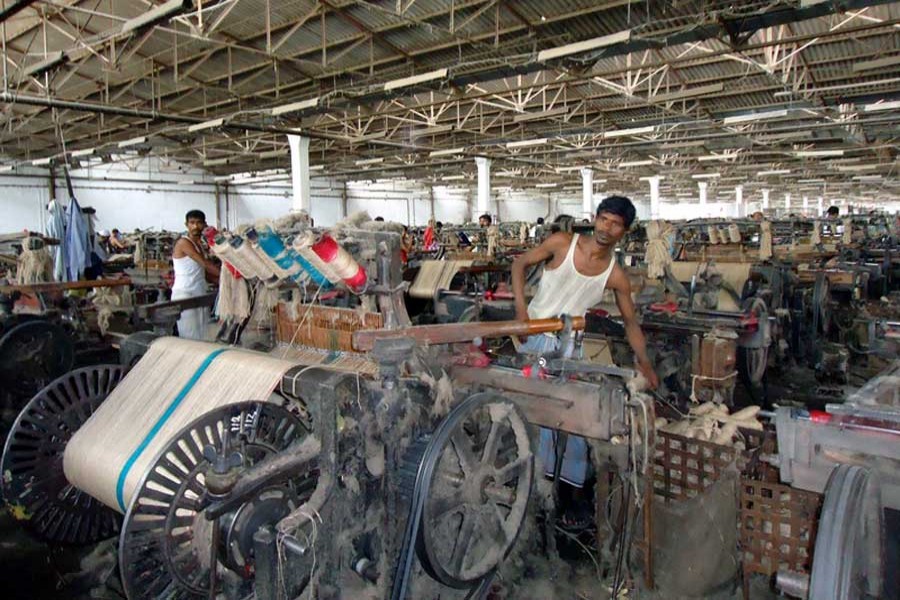The government has, in its latest drive, taken back eight jute and textiles mills from the private entrepreneurs as they had allegedly breached the key terms and conditions of privatisation, according to a report this week.
As per directive from the Prime Minister, the textiles and jute ministry decided to bring back 69 privatised mills that had violated conditions. Government officials have already visited 47 of the mills and prepared report on their latest status. Since 1982, the government had privatised 134 jute and textiles mills and most of the buyers violated terms and conditions of the privatisation.
In fact, failure to create jobs, keeping mills closed for long, converting some of the divested mills into different production units and even sell-off of land are construed as a gross breach of the deals.
One of the main objectives of handover of the mills to the private sector was to create employment, which had not been met. Besides, the mills' authorities did not clear the dues to Bangladesh Jute Mills Corporation (BJMC), Bangladesh Textile Mills Corporation (BTMC) and other financial institutions as per the agreements.
The government has plans to reopen the mills under public sector, and after taking back the errant mills, it will take necessary measures on reopening those after a close scrutiny. Some of the mills had remained closed for many years while owners of some others converted those into other production units, which they were not authorised to do. Even a few of them transferred the ownership to others.
Earlier, the BTMC tried to run most of its mills under public-private partnership (PPP) initiative. Unfortunately, the move failed to make any headway due to poor response from private entrepreneurs. The step was taken with a view to making its debt-ridden units viable again, financially.
None of the BTMC units could be brought under the PPP arrangement even nearly eight years after the government had initiated such a move back in 2009. Due to use of outdated machineries and mismanagement, many mills have closed their production despite an increase in demand for yarn and fabrics in the country.
Moreover, most of the factories lacked gas and electricity connections which are the primary demands of an entrepreneur. Due to old and dilapidated machineries, now only four out of 18 textile mills are in operation under BTMC.
Earlier a number of proposals were put forward to the government. Such proposals said that all the mills, either individually or in a group, could be structured like separate and limited companies.
Such companies may be run under PPP arrangements or as joint ventures (JVs) with private companies of reputation, having experience and a sound track record in managing units profitably, particularly in the sector.
The proposals also stated that the BTMC would perform the role of a shareholder, instead of being the authority for management, to facilitate private companies/entrepreneurs to make faster business decisions and facilitate their early implementation. Rather than fully privatising, the mills could be made vibrant by running them under PPP or as JVs, according to the BTMC.
The execution of such proposals could be one of the ways to save the corporation from a 'slow death' process, besides creating thousands of new jobs across the country. That could contribute favourably to meeting the increasing domestic demand for yarn and fabrics. Yet such proposals could not be implemented, excepting handing over some mills to the private entrepreneurs.
Some entrepreneurs in the private sector reportedly held initial discussions with high officials of the concerned ministry on use of the lands of the BTMC mills for establishing 'Textile Pallis'. Each textile mill of the corporation has a vast tract of land with ready infrastructural facilities where installation of new machinery and setting up of 'Textile Palli' will ensure its optimum use.
This will also help meet the increasing local demand for yarn and fabrics. The government needs only to take a prompt decision on the issue so that the country can reduce its present heavy dependence on imported yarn and fabrics.
However, some analysts are reported to be sceptical about successful implementation of large projects under PPP initiative. They have laid emphasis on identifying problems behind the slow progress of the PPP initiative and prioritising projects under it to ensure maximum success in taking effective steps for initiation and implementation of projects.
In the circumstances, it will be better to move ahead positively and fixing problems at the earliest without getting frustrated. In this context, Build-Operate-Transfer and Build-Own-Operate-Transfer can also be actively considered for implementation of some large projects.


